Casino Royale: A Reflective Review and Some Thoughts on the James Bond Mythos
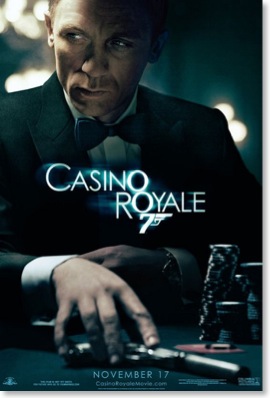
Well, times have changed, and James Bond has certainly changed over the years as well. Everyone seems to compare each actor who plays James Bond to Sean Connery. Well, I have a confession to make. I will always be favorable toward Roger Moore. Before you start throwing rotten fruit at me, please realize that Moore simply was Bond when I started going to see the movies as a kid. I like Connery as Bond, but when I think of Bond, I think of Moore. After all of these years of simply keeping that thought to myself, finally I've been echoed by someone of my generation in print. Joshua Rich, in the November 24 issue of Entertainment Weekly put it like this (slightly edited by me):
Now about Roger Moore. The Queen knighted the actor in 2003, yet many still can't forgive him for replacing Sean Connery and turning Bond into a smirking wise***. Well, you know what? Get over it. For anybody born between, say, 1970 and 1990, Moore, not Connery is the guy with the Walther PPK. And looking back past Timothy Dalton and The World Is Not Enough, he did just fine.
(Incidentally, I was born in 1967.) Of course, I'll admit that some of Moore's Bond movies are stinkers, especially Moonraker.
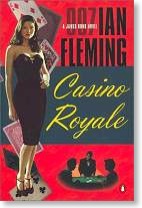
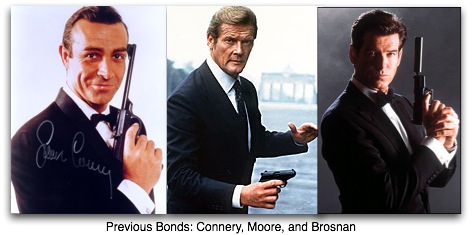
This is the first Bond film that is self-aware, that has lost its innocence and the simplicity of its world view, and has some understanding of the absurdity and sadness of its hero.
One crucial and revealing scene takes place on a Caribbean beach, where 007 is enjoying an erotic interlude between scenes of death-defying mayhem. His companion is the lovely Natalya Simonova (Izabella Scorupco), a Russian computer programmer who has joined his quest to save the world, etc. But instead of sexy small-talk, she asks Bond: "How can you act like this? How can you be so cold?" And Bond replies not with a sophisticated wisecrack but with, "It's what keeps me alive." In the earlier Bond adventures, no woman would have asked such a question, and 007 certainly would not have provided such an answer.
More evidence of Bond's loss of innocence: He is now aware that his history is repeating itself. Although all the Bond films have followed a story pattern so rigid that 007 could have predicted the next scene just by looking at his watch, there has always been the fiction that each adventure is more or less unique. Bond has never used an obvious line like, "Do you realize you're no less than the 12th megalomaniacal madman striving for world domination that I've met?" There is always one absolutely obligatory scene: Bond has been captured by the madman, who needs only to kill him. But he always talks first. Explains his plans for world domination. Boasts.
Preens. Doesn't realize that his mistress will become attracted to Bond. This scene is so inevitable, indeed, that it helped give rise to the definition of the Talking Killer in Ebert's Little Movie Glossary.
In "GoldenEye," the unthinkable happens. Both Bond and the madman apparently have read the Glossary, and can no longer act unself-consciously. Bond has fallen into the clutches of an evil genius who plans to rule Earth from cyberspace, via a powerful communications satellite. He narrows his eyes and says: "How shall we kill you?" And Bond replies: "What - no small talk? No chit-chat? That's the problem with the world these days - no one takes the time to conduct the proper interrogation." Indeed. Even Bond himself has changed. As played by Pierce Brosnan, the fifth 007, he is somehow more sensitive, more vulnerable, more psychologically complete, than the Bonds played by Sean Connery, George Lazenby, Roger Moore and Timothy Dalton. They were all, in their various styles, cold and dispassionate. Brosnan's Bond looks at home in the casinos of Monte Carlo, but he's more knowing, more aware of relationships. I am not sure this is a good thing. Agent 007 should to some degree not be in on the joke. He should certainly never have to listen to dialogue such as the following, from Agent 006: "The vodka martinis do silence the screams of all the men you've killed. And all those women you failed to protect." Perhaps our popular conception of maleness has changed so much that James Bond can no longer exist in the old way. In "GoldenEye," we get a hybrid, a modern Bond grafted onto the formula.
Unfortunately, by Die Another Day, Brosnan's fourth Bond film, the series had slipped back into it's earlier routine of gadgets and girls, although some of the darker side of being a secret agent was still retained in Bond's capture and subsequent torture by the North Koreans. That element of the last movie felt like something that Fleming would have written. Was it From Russian with Love or You Only Live Twice (the books, not the movies) where the Russians capture Bond, brainwash him and attempt to send him back as a double agent? I don't remember.
But if Brosnan's Bond was a step toward's Bond's loss of innoccence, Daniel Craig's incarnation takes it to the next level. I wish Andrew was still around to write a review on Casino Royale. I speculated recently with his wife, Leila, who has gone to see it in his honor, about whether or not he would have liked it. Andrew and I were often polar opposites in our tastes when it came to movies, and we had many spirited debates on the merits (or lack thereof) of various films. But now, having seen the movie myself, I do believe Andrew would have liked Casino Royale because of its iconoclastic spirit toward the movies that have come before it.
Personally, I wish that Pierce Brosnan could have played Bond at least one more time. Brosnan himself has said that the decision to dump him was a tremendous surprise, calling it a "blow to the gut." But there's no loyalty in the movie business. If you don't believe me, just ask Peter Jackson who has recently been dumped by New Line Cinema as the director for the Lord of the Rings prequel, The Hobbit.
Minor Spoilers Below...
Just as Casino Royale was the first James Bond novel written by Ian Fleming, this movie attempts to restart the franchise by giving us a Bond at the beginning of his career. In fact, in the earliest pre-looking down the barrel of a gun intro scene, Bond is not even a 00 (pronounced double-oh) agent yet. We get to see him "earn those 0's," so to speak. As I mentioned in the paragraph above, this movie is quite the iconoclast of the previous installments in the series, and seems to go out of its way not just to distance itself from the gadgets and camp of the earlier movies, but to even ridicule them at times. Here are some examples of the new direction taken in this Bond film:
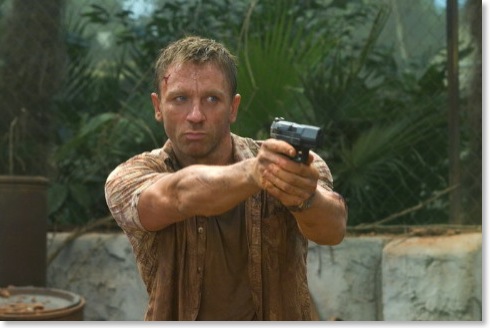
- We've rarely seen a Bond get so beat up and dirty as Daniel Craig. Brosnan may have come close (I again think of the North Korean capture in the last movie). After fighting off killers during a break from the card table, the main villain Le Chiffre notices that Bond has changed his shirt (the previous one got torn and bloody). Roger Moore et al. could always engage in any skirmish without nary a wrinkle to the tuxedo coat.
- Related to the above, we see Bond with cuts on his face (why there aren't bruises I have no idea) and tending his wounds. He even washes blood from his hands which may have figurative aspects. Again, this is the dirty side of the spy business that we never saw from Connery, Moore, or Brosnan.
- When asked by a bartender whether he wants his martini shaken or stirred, Bond, looking annoyed replies, "Do I look like I give a damn?"
- When Bond has one adversary cornered early in the movie, rather than let him talk on and on (see Ebert's "Talking Killer" above), Bond simply shoots him and is done with it.
- There are no women whose names count as double entendres. The main Bond girl in this movie is named Vesper Lynd (Eva Green) like the character in the book, and the only nod to previous movies is Bond's suggestion that Lynd's undercover alias should be "Stephanie Broadchest" of which she does not approve.
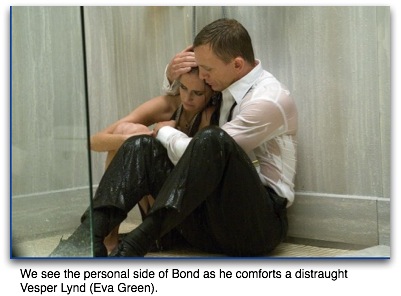
- Although Bond has a few clever lines in this movie, it's not near the level of punnery in previous installments. Fancy comebacks during torture are a defense mechanism, not the sign of being a wiseacre.
- There are no futuristic "spy" gadgets, but using current technology means lots of opportunities for product placement. Sony was everywhere with cell phones and laptops. There was such a large Sony presence in this movie (Sony now owns MGM which owns United Artists which owns the rights to the James Bond movies) that I half-expected to see Bond playing a new PS3.
- No gadgets means no "Q," who had most recently been played by John Cleese. However, there is a crack tech team for computer support that we see a few times. I suppose this is more realistic, but I'll miss "Q," especially the Cleese incarnation.
- Not only is there no Q, there's no Miss Moneypenny, ever dreamy-eyed over Bond. However, there is a reference to money and penny in the same scene when Bond first meets Lynd so at first audiences may mistake Lynd for the Moneypenney character.
I first read Casino Royale sometime in the mid-to-late eighties, and there were only two or three things I remembered for certain about the book. A buddy of mine saw the movie a few days before I did, so I asked him--"Did they include the torture scene?" If you've seen the movie, yes that was in the book--surprising for something originally written in 1953. Another thing I remember from the Fleming version was the card game at the center of the story. In the book they played baccarat, but I suppose to create suspense that a modern audience could follow, the game has been updated to Texas Hold 'Em Poker. Ugh.
Although the book's storyline is significantly altered from its original cold war context, the movie follows a good bit of the basic premise of the original story. This is quite a departure from many of the Bond movies that have taken names from Fleming's original works. Essentially, the story revolves around a high stakes card came hosted by a villain named Le Chiffre who is trying to raise a large amount of money back that he had inadvertently lost. Bond is sent in by MI6 because as explained in the movie, he has the best reputation as a card player among the agents. There's lots of action before, during, and after the card game, of course. In fact, at over 144 minutes, this is actually the longest Bond movie in the history of the series.
Although, we do see a more personal side of Bond, and perhaps strong clues as to why he is the way he is, Daniel Craig plays a much darker, colder spy than what most movie Bond fans will be used to. That doesn't mean that Craig's version won't be successful. This Bond is more like the character in the Bourne Identity/Supremacy movies or even the Transporter series with Jason Statham than the suave spy we've watched over the years. In spite of Bond's cold heart, and the ability to kill on command, Daniel Craig plays the character in more than one dimension; it just takes a while to get there. By the end of the movie, I began to actually like this Bond, and I felt sympathy for him. I don't know if I ever felt sympathy for the previous Bonds. But Daniel Craig's bond, if he is a hero, is a tragic one.
Kathy really liked this movie because she said it was more realistic--it depicted a more honest look at what a spy's life might be like. In her own review, she writes:
This Bond is rougher than the James Bonds we've come to know over the past 40 years in films. Daniel Craig plays the lethal agent with the perfect blend of toughness and charm. He's a real man with real scars. The scrapes he finds himself in are much more believable than the sometimes laughable escapades of Roger Moore and Pierce Brosnan.
I admit that the former Bonds played by Connery, Moore, Lazenby, Dalton, and Brosnan with their wisecracks and gadgets are more fantasy and escape than the current version with Daniel Craig. But that's why I liked the James Bond of the movies. When we say that all men want to be Bond, it was said in relation to the earlier incarnations. Daniel Craig does indeed make a good Bond if you like Fleming's original, but I don't want to be this one.









